英语常用语法:about的用法与语法说明
英语介词和动名词的用法

英语介词和动名词的用法词性是英语语法学习入门的基础,这一关不难攻破。
以下是小编为大家整理的关于介词和动名词的语法知识,希望能帮到你。
一、常用介词用法比较(1)as , likeas 表示"作为"强调身份,like (介词)表示"像"As a teacher, he cares for these children.Like a teacher, he cares for these children.(2)with , inwith 表示"外貌特征或附带的东西" ," 用……作工具"in 表示"衣着" "用某语言", 在固定搭配中也可用inA man with dark glasses wanted to buy drinks.A man in black wanted to buy drinks.The boy is learning to write in pencil / with a pencil.He retold the text in English.(3)for , tofor表示"为了."To 表示动作对象, "对, 向." 如:He would do anything for his motherland.Did you mention this to my father?你对我父亲提起过这件事吗?for 表示"就某情况而说 ", to 表示一"对某对象而言"如:It's quite warm today for February.就二月的天气,今天够暖和的。
What he told you just now was not new to me他刚才对你所说的话对我并不新鲜for 表示"目的,用途"。
英语常用介词用法与辨析

英语常用介词用法与辨析?■表示方位的介词:in, to, on1. in 表示在某地范围之内。
如:Shanghai is/lies in the east of China. 上海在中国的东部。
2. to 表示在某地范围之外。
如:Japan is/lies to the east of China. 日本位于中国的东面。
3. on 表示与某地相邻或接壤。
如:Mongolia is/lies on the north of China. 蒙古国位于中国北边。
■表示计量的介词:at, for, by1. at表示“以……速度”“以……价格”。
如:It flies at about 900 kilometers a hour. 它以每小时900公里的速度飞行。
I sold my car at a high price. 我以高价出售了我的汽车。
2. for表示“用……交换,以……为代价”。
如:He sold his car for 500 dollars. 他以五百元把车卖了。
注意:at表示单价(price) ,for表示总钱数。
3. by表示“以……计”,后跟度量单位。
如:They paid him by the month. 他们按月给他计酬。
Here eggs are sold by weight. 在这里鸡蛋是按重量卖的。
■表示材料的介词:of, from, in1. of成品仍可看出原料。
如:This box is made of paper. 这个盒子是纸做的。
2. from成品已看不出原料。
如:Wine is made from grapes. 葡萄酒是葡萄酿成的。
3. in表示用某种材料或语言。
如:Please fill in the form in pencil first. 请先用铅笔填写这个表格。
They talk in English. 他们用英语交谈(from 。
注意:in指用材料,不用冠词;而with指用工具,要用冠词。
how about的语法结构

How about的语法结构引言在英语交流中,我们经常会用到一些表达建议或征求意见的短语。
其中,“how about”就是一个常用的表达方式。
本文将探讨”How about”的语法结构及其用法,并将重点介绍它在不同句型中的应用。
一、How about的基本用法“How about”常常用于向他人提出建议、征求意见或询问对方的看法。
它可以引导一般疑问句、选择疑问句或陈述句等不同句型。
1. 一般疑问句在一般疑问句中,“how about”用于邀请对方表达自己的意见或提供建议。
例句: - How about going to the movies tonight? - How about havingdinner at that new Italian restaurant?2. 选择疑问句在选择疑问句中,“how about”一般提供几个选项,并询问对方的偏好或意见。
例句: - How about going to the beach or hiking in the mountains? - How about having pizza or Chinese food for lunch?3. 陈述句在陈述句中,“how about”常常用于引导一个建议或提议。
例句: - How about we meet at 7 PM for a coffee? - How about we take a short break and continue our discussion later?二、How about的用法扩展除了上述基本的用法之外,“how about”还可以与不同的词或短语搭配,形成更多种类的表达方式。
以下将介绍其中几种常见的搭配方式。
1. How about + 动名词在这种结构中,“how about”后面可以接动名词,用于提出一种活动或建议。
例句: - How about going swimming this afternoon? - How about having a picnic in the park?2. How about + 名词/代词“How about”后面也可以直接接一个名词或代词,用于提出一种具体建议或选择。
中考初中英语复习语法知识讲解(介词的用法)

中考英语语法知识——介词的用法一、about的用法关于(某人或物)What is she worried about ?她在担心什么呢?在…… 各处;在……附近He looked about the hall,but saw nobody. 他环顾大厅,可是一个人也没看见。
目的是;为了;涉及……Movies are all about making money these days.当今电影全都是为了赚钱。
二、 above的用法意为“在……以上,高于;超过”(表示职位、数量、年龄等)He is the man above her.他是她的上司。
The stone weighs above one ton.这块石头重一吨多。
She is above fifty years old.她 50 多岁了。
意为“在……上方”(表示位置)The whole sky above us is filled with stars.我们上方的整片天空布满了星星。
三、 against的用法逆,顶着;靠着,倚靠;撞击(表示方向或位置)Birds fly slowly against the wind.鸟逆风飞得慢。
He stood with his back against the wall.他背靠墙站着。
The cold rain beat against the window.冷雨敲窗。
反对(与 for 意义相反) ;违背I don't know whether he is for or against it.我不知道他是赞成还是反对它。
防备,以防They have got prepared against flood.他们已经做好了防洪准备。
衬托Flowers look better against green leaves.好花还需绿叶衬。
与……比赛We'll be competing against some of the best companies in Europe.我们将要和欧洲的一些最好的公司竞争。
about短语

about短语关于位置:当描述某物的大概位置时,可以用 "about"。
例如,"The book is about on the table."(书大概在桌子上)。
关于数量或程度:当描述一个大概的数量或程度时,可以用 "about"。
例如,"There are about 100 students in the class."(班里有大概100名学生)。
关于主题:当谈论一个大概或相关的主题时,可以用 "about"。
例如,"I am writing a report about climate change."(我正在写一份关于气候变化的报告)。
大约:当表示一个估计或近似值时,可以用 "about"。
例如,"The movie starts at about 7:30 PM."(电影大约在晚上7:30开始)。
关于:当描述某物的归属或来源时,可以用 "about"。
例如,"This information is about the company."(这些信息是关于这家公司的)。
大约:在表示时间、年龄、价格等的语境中,"about" 可以表示接近或大约。
例如,"She is about 25 years old."(她大概25岁)。
对于:在表示某人对某事的态度或观点时,可以用 "about"。
例如,"I am about ready to give up on this project."(我差不多要放弃这个项目了)。
总的来说,"about" 是一个非常灵活的短语,可以在许多不同的语境中使用。
名校版高考高中英语语法详解 about作为副词的用法及其常用短语

名校版高考高中英语语法详解about作为副词的用法及其常用短语英语单词about在日常阅读、口语及考试中常被使用或出现。
about 可以做介词和副词,今天就其作为副词的常见的五个意思和相关短语进行举例说明。
1.about的意思是“到处,四处活动”,比如:I'm used to going about alone.我习惯于到处走动。
The little boy ran about looking for his mother.这个小孩四处跑着找妈妈。
The birds were flying about and twittering with delight.鸟儿飞来飞去,高兴地叽叽喳喳地叫着。
2.about指“在附近”。
比如:There were few people about.附近没有几个人。
The man in charge hadn't been about just as the moment.负责的人现在不在附近。
When I got in the village,I found nobody about.到村里的时候,我发现附近没有人。
3.about的第三个意思是“在四周,向四周”。
比如:All about was the white snow.四周都是雪。
4.about指“大约,大概”,经常和一个数词连用,表示数量,长度,年龄,时间等等。
比如:I shall be with you in about twenty minutes.二十分钟之后,我和你在一起。
He is only about five feet high。
他只有五英尺高。
She got here about half past five。
他大约五点半到这里。
5.about第五个意思是“差不多,大概”,相当于almost。
比如:I have about finished.我差不多要完成了。
I'm about ready.我差不多准备好了。
英语高中语法介词的用法和常用介词的区别
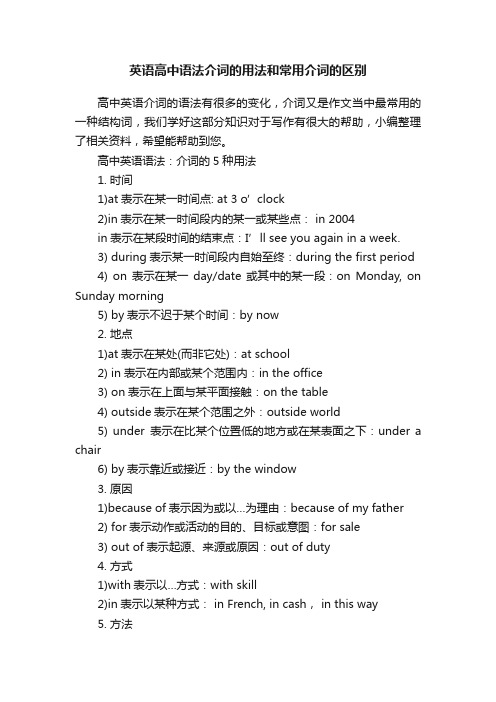
英语高中语法介词的用法和常用介词的区别高中英语介词的语法有很多的变化,介词又是作文当中最常用的一种结构词,我们学好这部分知识对于写作有很大的帮助,小编整理了相关资料,希望能帮助到您。
高中英语语法:介词的5种用法1. 时间1)at表示在某一时间点: at 3 o’clock2)in表示在某一时间段内的某一或某些点: in 2004in表示在某段时间的结束点:I’ll see you again in a week.3) during表示某一时间段内自始至终:during the first period4) on表示在某一day/date或其中的某一段:on Monday, on Sunday morning5) by表示不迟于某个时间:by now2. 地点1)at表示在某处(而非它处):at school2) in表示在内部或某个范围内:in the office3) on表示在上面与某平面接触:on the table4) outside表示在某个范围之外:outside world5) under表示在比某个位置低的地方或在某表面之下:under a chair6) by表示靠近或接近:by the window3. 原因1)because of表示因为或以…为理由:because of my father2) for表示动作或活动的目的、目标或意图:for sale3) out of表示起源、来源或原因:out of duty4. 方式1)with表示以…方式:with skill2)in表示以某种方式: in French, in cash, in this way5. 方法1) by表示方法、手段: by the back road, by bus, by working hard2) on表示运送方式:on a train, on foot3) in表示途径或材料:in oils高中英语语法中常用介词的区别1、 at、in、on:如:常用词组有: at noon, at night表示时间的 at, in, on:at 表示片刻的时间,at 8 o’clock,at midnight, at the end of, at that time, at the beginning of, at the age of, at Christmas, at New Year 等。
介词的种类与用法

介词的种类与用法介词是英语语法中的一种重要词类,它具有连接作用,在句子中常用来表达位置、时间、方式、原因等关系。
正确使用介词不仅可以使语句更加准确和流畅,还能让我们的表达更加具有逻辑性和准确性。
本文将介绍关于介词的种类与用法。
一、介词的定义与特点介词是一种虚词,它的主要特点是和名词、代词或名词性短语搭配使用,构成介词短语。
介词短语在句子中常作状语、定语或补语等成分。
二、介词的基本种类1. 表示位置关系的介词in、on、at、under、above、below等介词常用来表示物体的位置关系。
例如:- The book is on the table.(书在桌子上。
)- The cat is under the chair.(猫在椅子下面。
)2. 表示时间关系的介词in、on、at、before、after等介词常用来表示时间的前后顺序以及具体时间点。
例如:- I will go shopping in the morning.(我上午去购物。
)- They arrived at the airport on time.(他们准时到达机场。
)3. 表示方式关系的介词by、with、like、as等介词常用来表示行为方式或者比较对象。
例如:- She drew a picture with a pencil.(她用铅笔画了一幅画。
)- He speaks English like a native speaker.(他讲英语像个母语者。
)4. 表示原因关系的介词because of、due to等介词常用来表示某个事物的原因。
例如:- The match was cancelled due to heavy rain.(比赛因为大雨被取消。
)- He failed the exam because of laziness.(他因为懒惰而考试不及格。
)三、介词的常用搭配与固定搭配介词搭配是介词的重要用法之一,掌握了常用的介词搭配能够提高语言表达的准确性。
八年级上英语常用语法知识——感叹句(含解析)
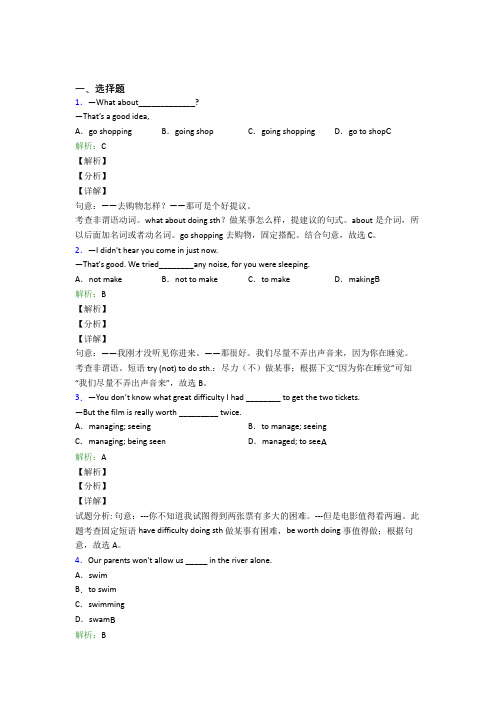
一、选择题1.—What about_____________?—That’s a good idea,A.go shopping B.going shop C.going shopping D.go to shop C解析:C【解析】【分析】【详解】句意:——去购物怎样?——那可是个好提议。
考查非谓语动词。
what about doing sth?做某事怎么样,提建议的句式。
about是介词,所以后面加名词或者动名词。
go shopping去购物,固定搭配。
结合句意,故选C。
2.—I didn't hear you come in just now.—That's good. We tried________any noise, for you were sleeping.A.not make B.not to make C.to make D.making B解析:B【解析】【分析】【详解】句意:——我刚才没听见你进来。
——那很好。
我们尽量不弄出声音来,因为你在睡觉。
考查非谓语。
短语try (not) to do sth.:尽力(不)做某事;根据下文“因为你在睡觉”可知“我们尽量不弄出声音来”,故选B。
3.—You don’t know what great difficulty I had ________ to get the two tickets.—But the film is really worth _________ twice.A.managing; seeing B.to manage; seeingC.managing; being seen D.managed; to see A解析:A【解析】【分析】【详解】试题分析: 句意:---你不知道我试图得到两张票有多大的困难。
---但是电影值得看两遍。
此题考查固定短语have difficulty doing sth 做某事有困难,be worth doing事值得做;根据句意,故选A。
英语语法及短语总结
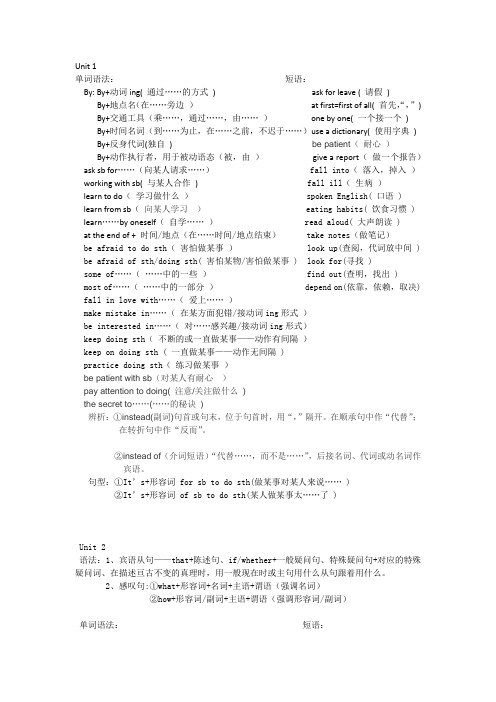
Unit 1单词语法:短语:By: By+动词ing( 通过……的方式) ask for leave ( 请假) By+地点名(在……旁边)at first=first of all( 首先,“,”) By+交通工具(乘……,通过……,由……)one by one( 一个接一个)By+时间名词(到……为止,在……之前,不迟于……)use a dictionary( 使用字典) By+反身代词(独自) be patient(耐心)By+动作执行者,用于被动语态(被,由)give a report(做一个报告)ask sb for……(向某人请求……)fall into(落入,掉入)working with sb( 与某人合作) fall ill(生病)learn to do(学习做什么)spoken English( 口语 ) learn from sb(向某人学习)eating habits( 饮食习惯 ) learn……by oneself(自学……)read aloud( 大声朗读 )at the end of + 时间/地点(在……时间/地点结束) take notes(做笔记)be afraid to do sth(害怕做某事) look up(查阅,代词放中间 ) be afraid of sth/doing sth( 害怕某物/害怕做某事 ) look for(寻找 )some of……(……中的一些) find out(查明,找出 )most of……(……中的一部分) depend on(依靠,依赖,取决) fall in love with……(爱上……)make mistake in……(在某方面犯错/接动词ing形式)be interested in……(对……感兴趣/接动词ing形式)keep doing sth(不断的或一直做某事——动作有间隔)keep on doing sth ( 一直做某事——动作无间隔 )practice doing sth(练习做某事)be patient with sb(对某人有耐心)pay attention to doing( 注意/关注做什么)the secret to……(……的秘诀)辨析:①instead(副词)句首或句末,位于句首时,用“,”隔开。
forget与forget about有何区别_用法辨析 英语语法.doc

forget与forget about有何区别_用法辨析一、基本区别1. forget 通常指忘记具体的东西(如名字、号码、地址等),forget about 后者通常指忘记一件事情(如开会、学习、吃饭、锁门等)。
比较:I forget her name. 我把她的名字给忘了。
Don’t forget about your study. 别忘了学习。
They were so busy that they even forgot about their own meals. 他们忙得连饭都忘记吃。
有时两者可换用,尤其是表示不要把放在心上时。
如:He forgot (about) her birthday. 他把她的生日忘了。
Let’s forget (about) our differences. 咱们不要把彼此的分歧放在心上。
2.表示忘记做某事,除可用forget to do sth 外,有时也可用forget about doing sth。
如:She had forgotten all about posting the letter. 她把寄信的事忘得一干二净。
另外,一般现在时的forget后可直接跟动名词表示忘记做过某事,但一般过去时的forgot后接动名词时,则通常会先接介词about(有时也有不用about的)。
如:I forgot about doing it. 我忘记已做此事了。
二、forget (about) it在口语中的用法口语中说forget (about) it有以下用法:①用于回答感谢,意为不客气。
如:A:Thank you very much for your help. 多谢你的帮助。
B:Forget about it. 不用谢。
②用于回答道歉,意为没关系。
如:A:I’m sorry for what I said. 我为我所说的话道歉。
B:Forget it! I don’t remember anyway. 没关系,反正我也没有记住。
think about back用法

think about back用法【摘要】【关键词】 think about back;短语动词;回想;时态;语气一、引言随着全球化的进程,英语已经成为了各行各业必备的交流工具。
在英语的学习中,除了单词和语法外,短语也是一个非常重要的部分,而think about back(回想)就是其中一个重要的短语动词。
在日常英语的应用中,think about back是一个常用的表达方式,因此本文将就这一短语的用法进行详细的描述和分析。
二、think about back的基本用法在英语中,有许多表达回想、回忆的短语,如reminisce about、reflect on、recall、remember等等。
而think about back也是其中的一个短语,用法简单,意思明确,常用来表示回想过去的事情。
例如:I often think about back to my childhood, when things were much simpler.(我常常回想童年时期的事情,那时候一切都很简单。
)I can't stop thinking about back to the time when we first met.(我无法忘掉我们初次相遇的时光。
)As I think about back on my life, I realize how many mistakes I've made.(当我回忆自己的人生时,我才意识到自己犯了多少错误。
)从上面的例句可见,think about back的用法相当简单,只需要在动词think之后加上介词about和副词back即可。
而在表达时间时,通常使用介词to或on来连接。
think about back还常用于疑问句和否定句中,如:Have you ever thought about back to the time when you were a child?(你曾经回忆过自己小时候的时光吗?)I don't want to think about back to that terrible day.(我不想回忆那个可怕的日子。
初中英语语法介词用法讲解和练习
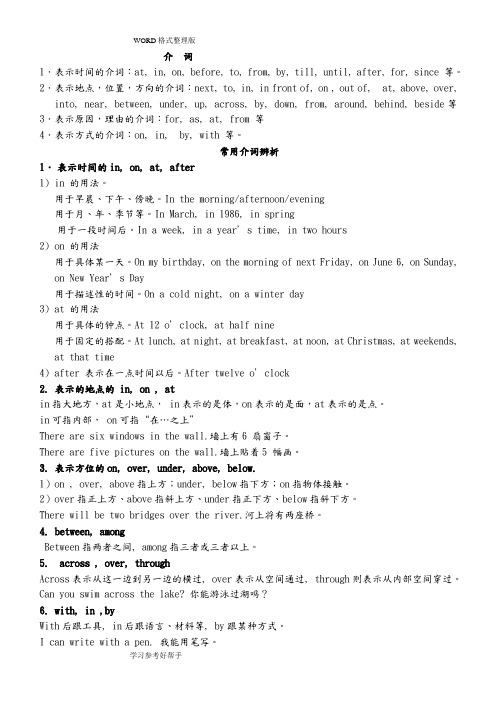
介词1.表示时间的介词:at, in, on, before, to, from, by, till, until, after, for, since 等。
2.表示地点,位置,方向的介词:next, to, in, in front of, on , out of, at, above, over, into, near, between, under, up, across, by, down, from, around, behind, beside等3.表示原因,理由的介词:for, as, at, from 等4.表示方式的介词:on, in, by, with 等。
常用介词辨析1.表示时间的in, on, at, after1)in 的用法。
用于早晨、下午、傍晚。
In the morning/afternoon/evening用于月、年、季节等。
In March, in 1986, in spring用于一段时间后。
In a week, in a year’s time, in two hours2)on 的用法用于具体某一天。
On my birthday, on the morning of next Friday, on June 6, on Sunday, on New Year’s Day用于描述性的时间。
On a cold night, on a winter day3)at 的用法用于具体的钟点。
At 12 o’clock, at half nine用于固定的搭配。
At lunch, at night, at breakfast, at noon, at Christmas, at weekends, at that time4)after 表示在一点时间以后。
After twelve o’clock2. 表示的地点的 in, on , atin指大地方,at是小地点, in表示的是体,on表示的是面,at表示的是点。
how about句型

how about句型摘要:一、how about 句型的概念与用途1.how about 句型的构成2.how about 句型的主要用途二、how about 句型的语法与用法1.语法结构2.用法详解三、how about 句型的实际应用与例句1.询问对方意见2.提出建议3.表达想法四、how about 句型的注意事项1.与其他类似句型的区别2.避免使用场合正文:【how about 句型的概念与用途】how about 句型是一种英语口语中常用的句型,它主要用于征求对方的意见、提出建议或者表达自己的想法。
这个句型的构成非常简单,通常由两部分组成:一是how about,二是所要询问或者表达的内容。
【how about 句型的语法与用法】1.语法结构:how about + 名词/动名词/形容词/副词+ 其他成分2.用法详解:- how about + 名词:征求对方对某个名词的意见,例如,How about the movie?(这部电影怎么样?)- how about + 动名词:提出一种建议或者想法,例如,How about going to the park?(去公园怎么样?)- how about + 形容词:询问对方对某个形容词的喜好,例如,How about a quiet place?(一个安静的地方怎么样?)- how about + 副词:表达对某种程度的认可,例如,How about a little bit more sugar?(再多加一点糖怎么样?)【how about 句型的实际应用与例句】1.询问对方意见:- How about the new restaurant?(新开的餐厅怎么样?)- How about the job offer?(这个工作机会怎么样?)2.提出建议:- How about we meet at the coffee shop?(我们约在咖啡店见面怎么样?)- How about taking a walk in the park?(去公园散步怎么样?)3.表达想法:- How about we try something new?(我们尝试新事物怎么样?)- How about we go shopping together?(一起去购物怎么样?)【how about 句型的注意事项】1.与其他类似句型的区别:- What about + 名词/动名词/形容词/副词+ 其他成分:同样用于征求对方意见或提出建议,但语气较正式,适用于正式场合。
初中英语语法——易混动词用法辨析

初中英语语法——易混动词用法辨析1.agree with,agree to和agree on*agree with...指“同意某人或某人的意见、观点、决定、方法、安排、说明”等,其后能够是一个名词,也能够是what引起的从句。
如:I don’t agree with you.I don’t agree with what you said.*agree to...是指“同意某打算、建议、或建议”等;后跟动词原形,意为“同意干某事”。
如:Who else will agree to this suggestion besides him?We agreed to start early.*agree on...指在某方面取得一致的看法或意见。
如:We agree on leaving for Beijing the next day.2.answer和reply*answer是常用词,可指口头、笔头,甚至行动回答,有时可与reply 通用。
如:Who can answer the question?Please answer the telephone.*reply较answer正式,既可指用语言、书面作答,也可指用动作或手势作答,常用于正式场合或书面语中,指通过慎重考虑作出的答复。
如:I sent in my application,and the school replied immediately.3.apologize to和apologize for*apologize to sb.相当于say sorry to sb. 表示“向某人道歉”。
如:You should apologize to the old man.*apologize for sb.意为“替某人道歉或认错”。
如:4.argue about和argue with*argue about指“为某事而争辩、争吵”。
如:Don’t argue about the matter any more.*argue with指“为某人争吵、争辩或吵架”。
英语语法:形容词与介词的常见惯用的搭配
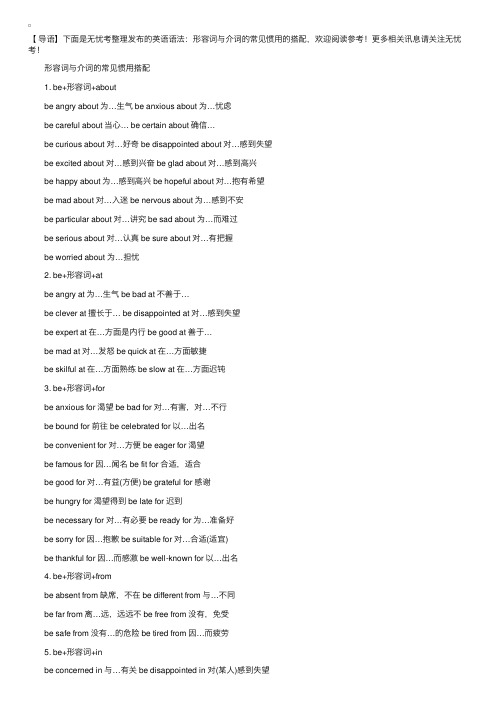
【导语】下⾯是⽆忧考整理发布的英语语法:形容词与介词的常见惯⽤的搭配,欢迎阅读参考!更多相关讯息请关注⽆忧考! 形容词与介词的常见惯⽤搭配 1. be+形容词+about be angry about 为…⽣⽓ be anxious about 为…忧虑 be careful about 当⼼… be certain about 确信… be curious about 对…好奇 be disappointed about 对…感到失望 be excited about 对…感到兴奋 be glad about 对…感到⾼兴 be happy about 为…感到⾼兴 be hopeful about 对…抱有希望 be mad about 对…⼊迷 be nervous about 为…感到不安 be particular about 对…讲究 be sad about 为…⽽难过 be serious about 对…认真 be sure about 对…有把握 be worried about 为…担忧 2. be+形容词+at be angry at 为…⽣⽓ be bad at 不善于… be clever at 擅长于… be disappointed at 对…感到失望 be expert at 在…⽅⾯是内⾏ be good at 善于… be mad at 对…发怒 be quick at 在…⽅⾯敏捷 be skilful at 在…⽅⾯熟练 be slow at 在…⽅⾯迟钝 3. be+形容词+for be anxious for 渴望 be bad for 对…有害,对…不⾏ be bound for 前往 be celebrated for 以…出名 be convenient for 对…⽅便 be eager for 渴望 be famous for 因…闻名 be fit for 合适,适合 be good for 对…有益(⽅便) be grateful for 感谢 be hungry for 渴望得到 be late for 迟到 be necessary for 对…有必要 be ready for 为…准备好 be sorry for 因…抱歉 be suitable for 对…合适(适宜) be thankful for 因…⽽感激 be well-known for 以…出名 4. be+形容词+from be absent from 缺席,不在 be different from 与…不同 be far from 离…远,远远不 be free from 没有,免受 be safe from 没有…的危险 be tired from 因…⽽疲劳 5. be+形容词+in be concerned in 与…有关 be disappointed in 对(某⼈)感到失望 be engaged in 从事于,忙于 be experienced in 在…⽅⾯有经验 be expert in 在…⽅⾯是⾏家 be fortunate in 在…⽅⾯幸运 be honest in 在…⽅⾯诚实 be interested in 对…感兴趣 be lacking in 缺乏 be rich in 富于 be skilful in 擅长于 be successful in 在…⽅⾯成功 be weak in 在…⽅⾯不⾏ 6. be+形容词+of be afraid of 害怕 be ashamed of 为…感到羞愧 be aware of 意识到,知道 be capable 能够,可以 be careful of ⼩⼼,留⼼ be certain of 确信,对…有把握 be fond of 喜欢 be free of 没有,摆脱 be full of 充满 be glad of 为…⽽⾼兴 be nervous of 害怕 be proud of 为…⾃豪 be short of 缺乏 be shy of 不好意思 be sick of 对…厌倦 be sure of 肯定,有把握 be tired of 对…厌烦 be worthy of 值得,配得上 7. be+形容词+to be accustomed to 习惯于 be blind to 对…视⽽不见 be close to 靠近,接近 be cruel to 对…残酷,对…⽆情 be devoted to 献⾝于,专⼼于 be equal to 等于,能胜任 be familiar to 为(某⼈)所熟悉 be harmful to 对…有危害 be important to 对…重要 be open to 对…开放,易受到 be opposed to 反对,不赞成 be opposite to 在…对⾯,和…相反 be polite to 对…有礼貌 be related to 与…有关,与…有亲戚关系 be respectful to尊敬 be rude to 对…⽆礼 be similar to 与…相似 be true to 忠实于,信守 be used to 习惯于 be useful to 对…有⽤ 8. be+形容词+with be angry with 对(某⼈)⽣⽓ be bored with 对…厌烦 be busy with 忙于 be careful with ⼩⼼ be concerned with 关于,与…有关 be content with 以…为满⾜ be delighted with 对…感到⾼兴 be disappointed with 对(某⼈)失望 be familiar with 熟悉,精通 be honest with 对(某⼈)真诚 be ill with 患…病 be patient with 对(某⼈)有耐⼼ be pleased with 对…满意(⾼兴) be popular with 受…欢迎 be satisfied with 对…满意 be strict with 对(某⼈)严格。
英语高中语法57个常用的介词整理
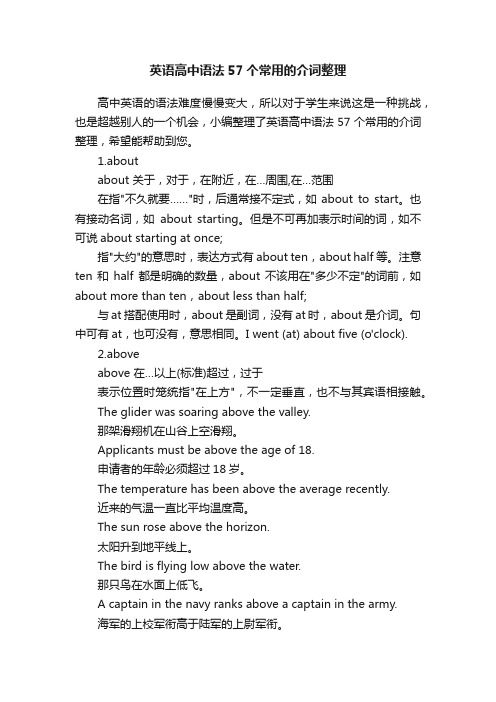
英语高中语法57个常用的介词整理高中英语的语法难度慢慢变大,所以对于学生来说这是一种挑战,也是超越别人的一个机会,小编整理了英语高中语法57个常用的介词整理,希望能帮助到您。
1.aboutabout 关于,对于,在附近,在…周围,在…范围在指"不久就要……"时,后通常接不定式,如about to start。
也有接动名词,如about starting。
但是不可再加表示时间的词,如不可说about starting at once;指"大约"的意思时,表达方式有about ten,about half等。
注意ten和half都是明确的数量,about不该用在"多少不定"的词前,如about more than ten,about less than half;与at搭配使用时,about是副词,没有at时,about 是介词。
句中可有at,也可没有,意思相同。
I went (at) about five (o'clock).2.aboveabove 在…以上(标准)超过,过于表示位置时笼统指"在上方",不一定垂直,也不与其宾语相接触。
The glider was soaring above the valley.那架滑翔机在山谷上空滑翔。
Applicants must be above the age of 18.申请者的年龄必须超过18岁。
The temperature has been above the average recently.近来的气温一直比平均温度高。
The sun rose above the horizon.太阳升到地平线上。
The bird is flying low above the water.那只鸟在水面上低飞。
A captain in the navy ranks above a captain in the army.海军的上校军衔高于陆军的上尉军衔。
write 与write about的区别_用法辨析 英语语法.doc

write 与write about的区别_用法辨析write 与write about的区别。
问题见:1. write your ideas 意思是:把你的想法(观点,看法)写出来。
2. write about your ideas 意思是:把你想法(观点,看法)的论据(理由)写出来。
前者表示:动宾关系是直接的;后者表示:动宾关系是间接接的。
有网友曾经问我类似的句子,也许能给你些许启发。
网友问我:I read about the book before. 请问老师,读书是read the book,为何还要加一个about呢?这个问题很有意思。
在这个句子中,read about the book不是读书,而是读到关于那本书的介绍。
请比较以下两个句子有何异同:I’ve read the novel and I think it is very instructive. 我读过那本小说,我认为它很有教育意义。
I’ve read about the novel, but I wonder whether it is wor th reading at all. 我读过那本小说的介绍,但我不知道它是否值得一读。
read和read about为何有如此大的差别呢?原来,在read the novel 中,read是及物动词,是一种直接的阅读;而在read about the novel中,read是不及物动词,是一种间接的阅读,可以理解为在它后面省略了something, 即:read something about the novel。
总之,read the book 和read about the book是直接和间接的关系。
又如:I know about him, but I don’t know him. 我听说过他,但我不认识他。
We heard about / of the pop singer, but unfortunately we haven’t heard her sing. 我们听说过这位流行歌手,但很遗憾我们没有亲耳听她演唱过。
about在句中的成分

about在句中的成分
在句子中,"about"可以作为介词、副词或形容词。
作为介词时,"about"通常表示方向、位置、关系、主题等,例如,"I'm
thinking about my vacation plans."(我正在考虑我的假期计划。
)作为副词时,"about"通常表示大约或周围,例如,"There were about 50 people at the party."(派对上大约有50人。
)
作为形容词时,"about"通常表示在周围或附近,例如,"He is looking for his hat, it's somewhere about the house."(他在
找他的帽子,它在房子附近的某个地方。
)总的来说,"about"在句
子中可以用来表示方向、位置、时间、数量等不同的成分,根据具
体的语境和句子结构来确定其具体的语法成分。
- 1、下载文档前请自行甄别文档内容的完整性,平台不提供额外的编辑、内容补充、找答案等附加服务。
- 2、"仅部分预览"的文档,不可在线预览部分如存在完整性等问题,可反馈申请退款(可完整预览的文档不适用该条件!)。
- 3、如文档侵犯您的权益,请联系客服反馈,我们会尽快为您处理(人工客服工作时间:9:00-18:30)。
英语常用语法:about的用法与语法说明
目前,AEIS报名受到的关注越来越高,AEIS录取
竞争越来越激烈。
这里应广大学子的要求,为大家提供AEIS英语技巧,这次介绍的是about
的用法与语法说明。
1. 表示“关于”,注意与介词 on 的区别:
about 指泛泛地或非正式地谈论某事,其谈论的内容也较为普通;而 on
则指比较有系统地或理论性较强地论述某事,其论述的内容较正式或较为严肃。
试比较:
(1) a book on rabbits 指的是一本论及兔子的学术著作
(2) a book about rabbits 指的可能是一本供小孩看的关于兔子的故事书
2. 表示“带在身上”,一般指随身带的小物品,有时可与表示类似含义的介词 with
on 换用:
He has a watch about [on, with] him. 他带着表。
3. 用于数字前,表示“大约”:
The computer cost me about 600dollars. 这台电脑大约花了我600美元。
4. 在动词 know, hear, speak 等之后用不用介词 about / of, 含义有差别:
I have heard about him, but I don’t know him. 我听到过一些关于他的事,但不认识他这个人。
I’ve heard of him, but I don’t know about him. 我听说过他,但我不知道有关他的情况。
比较:
know sb 认识某人
know of sb 知道有某人
know aboutsb 知道有关某人的事或情况
hear sb 听到某人 (讲话)
hear of sb听说过某人
hear about sb 听到关于某人的事或情况
5. be about to (do),意为“即将”、“马上”。
注意该短语不与具体的时间状语 (如:
soon, tomorrow, immediately 等)连用:
正:He is about to return to his homeland. 他即将回乡。
误:He is about to return to his homeland tomorrow.
(1) 该短语可与并列连词when (这时)连用:
I was (just) about to go to bed when the telephone rang.
我正要上床睡觉,这时突然电话铃响了起来。
(2) be about 之后可接动名词 (但 be about to 之后不能接动名词):
I was (just) about going to bed when the telephone rang.
我正要上床睡觉,这时突然电话铃响了起来。
6. be about 在干…,忙于…:
What are you about? 你在干什么?
更多AEIS备考信息:
新加坡aeis考试预备班好不好申请
新加坡留学:AEIS申请方案
新加坡AEIS英文考试精要
AEIS英语:动词不规则变化解密。
